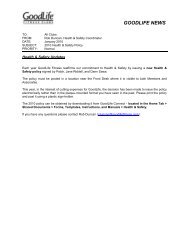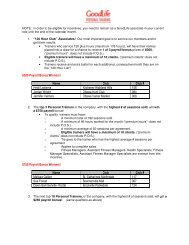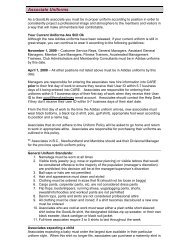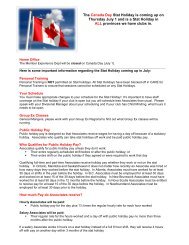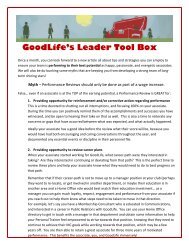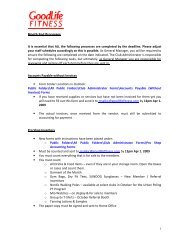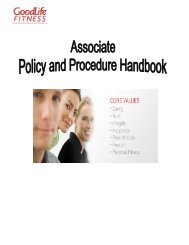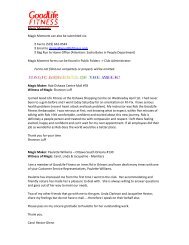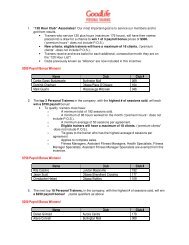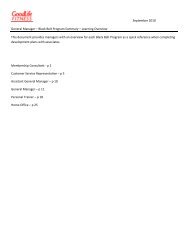View/Print ALL Articles - GoodLife Fitness
View/Print ALL Articles - GoodLife Fitness
View/Print ALL Articles - GoodLife Fitness
- No tags were found...
You also want an ePaper? Increase the reach of your titles
YUMPU automatically turns print PDFs into web optimized ePapers that Google loves.
Earnings, for example, vacation pay, severance pay... made or allocated during the 2-week waiting period will be deducted in the first 3 weeks for which benefit is otherwisepayable following the waiting period. In some instances, the 2-week waiting period maybe waived or deferred, but only under certain circumstances, for example:If you get paid sick leave pay from your employer following your last day worked, thewaiting period may be waived, If parental benefits are being shared by the both parents,only one waiting period needs to be served. For example, if a 2-week waiting period hasalready been served for maternity benefits by the first parent, the second parent claimingparental benefits can have the waiting period deferred. In the event the second parentsubsequently claims regular or sickness benefits after parental benefits, the 2-weekwaiting period would then need to be served. If you receive group insurance payments,you can serve the 2-week waiting period during the last two weeks that these insurancepayments are being paidHow long can you receive maternity and parental benefits?A combination of maternity and parental benefits can be received up to a combinedmaximum of 50 weeks.You could receive up to a maximum of 65 weeks of combined sickness, maternity andparental benefits instead of the normal combined maximum of 50 weeks. In order to beeligible for the increased number of weeks, the following conditions must be met duringyour benefit period: you have not been paid regular or fishing benefits, you have been paidsickness, maternity and parental benefits; and you have been paid less than the maximumof 15 weeks of sickness benefits or less than 35 weeks of parental benefits.You do not have to fill out reports during maternity and/or parental benefits. If you areapplying for maternity and/or parental benefits, you do not have to complete reports inorder to receive your payments. To do this, you must sign a declaration of exemption atthe time of applying.In order to get paid: A payment cannot be issued to you without a completed claimant'sreport. If you are applying for maternity and/or parental benefits and have chosen not tocomplete reports, your payments will be made directly to your bank account with DirectDepositWorking while on maternity, parental and sickness benefits: If you work while onmaternity or sickness benefits, your earnings will be deducted dollar for dollar from yourbenefits. On the other hand, if you work while on parental benefits you can earn $50 perweek or 25% of your weekly benefits, whichever is higher. Any monies earned above thatamount will be deducted dollar for dollar from your benefits. However, effective December11, 2005, if you are living in one of the 23 participating economic regions, the amount youcan earn while working part-time and receiving EI benefits is the greater of $75 or 40 % ofweekly benefits. You must, of course, report any earnings you make while collectingmaternity, sickness or parental benefits. If you chose not to complete reports, you mustdeclare your earnings by calling the telephone information service at 1 800 206-7218, from8:30 am to 4:30 pm, and press "0" to speak to a representative.Various types of earnings: Earnings paid or payable by your employer at the end of youremployment or while you are receiving benefits, generally affect payment of your benefits.How much will you receive? The basic benefit rate is 55% of your average insuredearnings up to a maximum amount of $435 per week. Your EI payment is a taxableincome, meaning federal and provincial or territorial taxes, if it applies, will be deductedfrom your payment. If your benefit rate is less than $435 and you are in a low-incomefamily — net income up to a maximum of $25,921 per year — with children and you oryour spouse receive the Canada Child Tax Benefit (CCTB) , you could be entitled to theFamily Supplement. The weekly EI payment and the number of weeks to be paid remainthe same even if you give birth to more than one child at the same time. At the same timeConfidential and Proprietary Information of Goodlife <strong>Fitness</strong> Clubs | V14 July 2009 57




